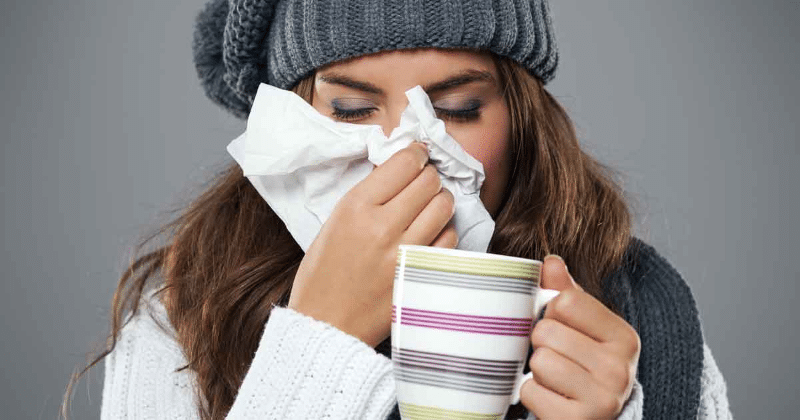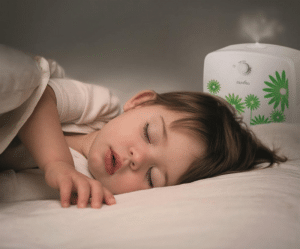Contents
Humidity is the amount of water vapor in the air. The experts tell us to have between 30% and 50% humidity and others say 40% to 60%. Ideally, it is your choice, but you do not want it so high you have condensation on your windows and you smell a musky odor caused by mold and mildew very dangerous for those suffering from allergies and asthma.
Low humidity and very dry air is equally perilous and detrimental to your health in mainly two areas—the skin and respiratory system. Here is why. During the winter months, gas-forced air furnaces, and other heaters dry out the air in the home environment. Some climates are dry out doors and it’s considerably drier indoors when running the heat. Humidity in semi-arid climates can be as low as 2%-20% all year long.

Health Issues from Dry Air
Dry air leads to irritated sinuses, dry nasal mucous membranes, dry scratchy throat, and itchy eyes. The mucous lining of the respiratory tract can become inflamed from dry air with low humidity. When nature’s defensive barricade is constricted to work as intended, your risk is greater for colds, flu, infections, and dry skin. Viruses thrive longer when it is dry and that can increase your chance of contacting the bugs. Flu viruses definitely live longer and infect more people when humidity is low.

Dry Nasal Passages and Sore Throats
When more moisture is removed from mucous membranes to moisten the dry air taken in, the membranes dry to the point that it cannot recover without help from humidity. That’s why nosebleeds happen. The sinus cavities dry and the nasal passages become dry. The same dryness occurs in the throat and mouth when the air is dry.
The mucous membranes are sticky filtering out microbes and viruses. When the membranes are dry, the pathogens can slip right into our bodies. This is one reason flu is so widespread in the cooler months of fall and winter when the heat is turned on.
Low Humidity on Skin and Eyes
Dry air irritates and dries the eyes of natural tears. Most contact lens wearers use wetting drops continually when the air has low humidity. The tears evaporate and blinking is more frequent, the eyes are uncomfortable, feeling scratchy, and itchy.
Low humidity and colder temperatures play a tremendous role with dry, cracked, itchy skin. Fingers around the nails tend to split open and are very painful since we use our hands so much. Dry air causes dry chapped lips that become scaly feeling and hurt as well. Dry air literally sucks the moisture from your body. Think about what it’s doing to your furniture and plants. Those brown leaf edges are from dry air drawing out the plant’s water.
Broken cracked skin sometimes bleeds and that can be an entryway for germs to enter your body.
When the humidity in your environment drops to 20%, it’s time to do something about it for the sake of your health and everything in your environment.
Humidification Best Choices
The best choice in humidifiers is steam or evaporative units. Cool mist humidifiers can possibly distribute the mist tainted with allergens such as dust mite excretion, pet dander, molds, and pollen.
Tips for Adding Moisture for Health Benefits
Besides a whole-house or portable humidifier, try using a small and personal diffuser. These small units work well in conjunction with all humidifiers. Essential oils can be used for dry mucous membranes and nasal passages and can relieve dryness and provide aroma. Many of the 100% pure therapeutic oils relieve nasal problems, improve breathing, and fight infections. Use an essential oil diffuser to inhale steam vapors from eucalyptus, camphor, lavender, lemon, tea tree, pine, and drink Echinacea tea.
Drink lots of water to hydrate your entire body to help with dryness. Try omega-3 fatty acids found in fresh salmon and krill oil. These are important for dry and flaky skin. With these oils, the skin cells will become stronger and have more moisture in the dry winter months. Omega-3 fats help calm irritated skin due to its anti-inflammatory properties. Pure coconut oil is a wonderful oil to use in conjunction with a humidifier. The oil helps to exfoliate the outer layer of dead skin cells and your body will make new cells under the dead stuff. With additional humidity, you will see improved skin conditions.

Stay Hydrated
It doesn’t matter whether you are outdoors or indoors, staying well hydrated is very important. Yes, moisturizers, lotions, and lip creams will relieve your symptoms for slow loss of moisture. You must replace lost moisture to effectively reestablish moisture for feeling good. By using a home humidifier indoors, you will add moisture that heating systems remove from the air during the coldest of days.
As you have read here, there are effects from high or low humidity. Each one can have harmful effects for your body. Therefore, when you provide relative humidity to be 30%-50%, it is great for your body and stops the growth of allergens and pathogens.
Be healthy this winter and thanks for stopping by to read this important information so vital to good health.





Can you recommend one please as I always suffer from colds and sinus problems